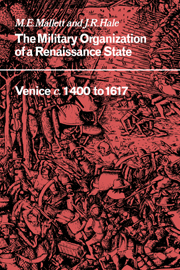Book contents
- Frontmatter
- Contents
- List of illustrations
- Acknowledgements
- References and abbreviations
- Map 1 The Terraferma in the fifteenth and sixteenth centuries
- Map 2 The empire da Mar
- PART I c. 1400 to 1508
- PART II 1509–1617
- 8 The historical role of the land forces 1509–1617
- 9 The wars
- 10 Government: policy, control and administration
- 11 The higher command
- 12 Manpower
- 13 Cavalry, infantry, artillery
- 14 Fortifications in the Terraferma
- 15 The defence of the maritime empire
- 16 The costs of defence and war
- Conclusion: the European context 1525–1617
- Appendix Infantry wages in the sixteenth century
- Select bibliography
- Index
12 - Manpower
Published online by Cambridge University Press: 22 October 2009
- Frontmatter
- Contents
- List of illustrations
- Acknowledgements
- References and abbreviations
- Map 1 The Terraferma in the fifteenth and sixteenth centuries
- Map 2 The empire da Mar
- PART I c. 1400 to 1508
- PART II 1509–1617
- 8 The historical role of the land forces 1509–1617
- 9 The wars
- 10 Government: policy, control and administration
- 11 The higher command
- 12 Manpower
- 13 Cavalry, infantry, artillery
- 14 Fortifications in the Terraferma
- 15 The defence of the maritime empire
- 16 The costs of defence and war
- Conclusion: the European context 1525–1617
- Appendix Infantry wages in the sixteenth century
- Select bibliography
- Index
Summary
foreigners
Among the many myths of Venice was that of a commercial governing class active at sea but passive, to the point of craven pacificity, on land. The Terraferma had been won by the hired help of mercenaries whose success, as Machiavelli put it, constituted a miracle; the Venetians' subsequent defeat at Agnadello was the result, he claimed, of ‘their miserable baseness of spirit, caused by a wretched military system’. The allies of Cambrai put it about in 1509 that ‘the Venetians would have to return to their original jobs as fishermen, for they were not worthy to rule a state and an empire’, a gibe echoed in the contemptuous tirade Henry VIII addressed to the Venetian ambassador in 1516: ‘Vos estis piscatores.’ The view was fostered by the Venetians themselves. The bitterness of defeat led Girolamo Priuli to reflect that the Venetians had become better at thinking than acting; emasculated by peace and prosperity they had left the defence of the fatherland to foreigners who had no concern beyond their pay. In the flush of victory, with the Terraferma regained in 1517, a party of patricians bragged to the Turks' ambassador (who had compared their military system unfavourably with his own) that ‘in the recent cruel war, in which all the monarchs of the world were ranged against us, not one man in this city was killed; all was done with money and at the cost of foreign soldiers' lives’. This connivance in projecting a pacific image was later confirmed by the most influential of all contributions to the mature Myth of Venice, Gasparo Contarini's De magistratibus et republica Venetorum.
- Type
- Chapter
- Information
- The Military Organisation of a Renaissance StateVenice c.1400 to 1617, pp. 313 - 366Publisher: Cambridge University PressPrint publication year: 1984



